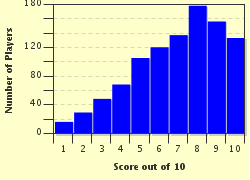
Some German Military Terms Trivia Quiz
This quiz will give you some terms in German that all relate to the Bundeswehr (German defense forces). You decide whether each term translates to a rank, a piece of equipment, a unit or something else.
A multiple-choice quiz
by WesleyCrusher.
Estimated time: 4 mins.
- Home
- »
- Quizzes
- »
- World Trivia
- »
- Languages
- »
- German
